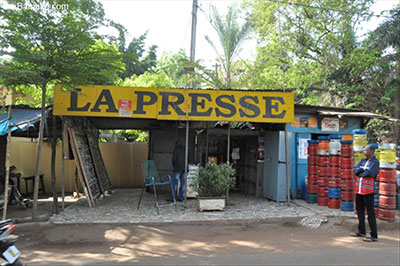Mali’s press has endured one attack too many.
Since the coup d’état of March 22, 2012, CPJ has documented a staggering 62 anti-press violations across Mali. Journalists and media houses have become ready targets of attacks, threats, intimidation, assassination attempts, arbitrary arrests, detentions, and censorship by separatist and Islamist militant groups and government security forces alike.
Now, in a statement on March 11, journalists declared an indefinite strike to demand the release of Boukary Daou, editor of the daily Le Républicain, who has been detained without charge since March 6 by the State Security, Mali’s intelligence agency. Daou was arrested for publishing an open letter by a Malian army officer named Captain Touré to interim President Dioncounda Traoré, protesting a January presidential decree granting coup leader Captain Amadou Sanogo a whopping monthly salary of 4 million CFA francs ($8,000) among other benefits. In the March 1 letter, the author claimed to be fighting in the ongoing French-led war against Al-Qaeda-linked militants in Mali’s north, and warned that soldiers on the front line would stop fighting within two weeks if the government failed to withdraw Sanogo’s ‘reward’ for organizing a coup d’état.
In direct reprisal Sanogo ordered Daou’s arrest, according to news reports and local journalists, who say the coup leader tasked with reforming Mali’s security forces tacitly runs the country despite formally ceding presidential power to Traoré in April 2012.
Daou is being held without access to lawyers or his family, and he has been beaten and interrogated about the source of the letter, according to media reports. In the past year, State Security agents have detained and interrogated at least 12 journalists over articles critical of the government, CPJ research shows.
Malian state broadcaster ORTM reported that Traoré, while on a state visit to Senegal, told journalists that Daou had incited the Malian army to desert. Under the pretext of a state of emergency in Mali, Traoré declared that Daou would remain in detention for going “beyond his press freedom rights,” RFI reported. “He was arrested so we can know more. And he will be freed if, and I mean if, there is nothing else besides what was written,” Traoré said.
Private media outlets are not accepting the government position. Following unsuccessful deliberations to secure Daou’s release, outlets in the capital, Bamako, initiated on March 12 an unprecedented media blackout, according to news reports. Radio stations have refused to broadcast, while newspapers have been absent from the stands. By the second day, media outlets across the country had joined the protest, Daouda Mariko, the president of Mali’s Union of Free Radio and Television Broadcasters (URTL in French), told me.
“We have total support. All newspapers in Mali are now observing the strike. And we have 98 percent compliance from all radio stations in the country,” Mariko said.
Stuck in the middle of the impasse between the government and the press are Malian citizens. Only Mali’s state-run L’Essor newspaper and the public radio and television broadcaster ORTM are in full operation–not affording much choice to a populace hungry for balanced news and information amid war and political chaos. In fairness, state-run media have within their constraints reported on the paralytic effect of the strike, with a focus on how an increasingly exasperated citizenry are waking up to empty newspaper stands.
Even after Daou’s release, the journalists plan to sustain a blackout on coverage of government institutions, to push the government to enter direct talks with the media in view of avoiding recurrent attacks on journalists and media houses.
The decision to strike is a costly one. But ultimately it is taken in defense of journalism and press freedom in Mali, Assane Koné, editor-in-chief of Le Républicain, told me. “Yes, we are losing a lot of revenue. Journalism is our livelihood. But we are determined to go ahead with the strike because it is necessary for the survival of our profession,” Koné said.
